Episode 5
Air Date:
1/9/76
Synopsis:
Loretta performs again at the Capri Lounge to a less than enthusaistic audience. Martha does what she can to keep Grandpa's behavior under control. Cathy is forced to consider her career options. Tom and Mary connect romantically. Almost.
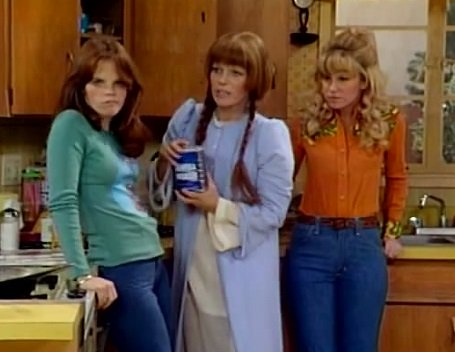
Review and Commentary:
One convention of daytime soaps that MH2 doesn't try to ape is the way soaps typically reserved the most dramatic plot developments and cliffhangers for Fridays to entice viewers to return next week. Very little happens in this episode plot-wise (unless you count Cathy getting fired from her waitressing job at the Capri, which is hardly the stuff of cliffhangers.) But this is nonetheless a solidly entertaining episode, with more of the nuanced, layered development of Tom and Mary's marital problems that we've already come to expect.
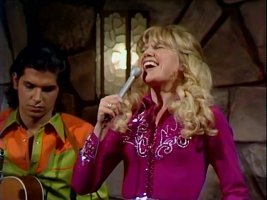 We open at the Capri lounge, where Loretta is performing the epic-ly tacky song she wrote about the Lombardi murders, "Riding the Train to Heaven". Remember that when she sang this for the reporter in episode 2, Mary Kay Place purposely squawked some of the notes to milk some humor from her singing itself. Here all the humor comes from the inappropriateness of the song itself, reflected in the audience's reaction. They slip out of the lounge one by one, half bored and half disbelieving. Only Charlie remains, enraptured by everything his wife does, as always.
We open at the Capri lounge, where Loretta is performing the epic-ly tacky song she wrote about the Lombardi murders, "Riding the Train to Heaven". Remember that when she sang this for the reporter in episode 2, Mary Kay Place purposely squawked some of the notes to milk some humor from her singing itself. Here all the humor comes from the inappropriateness of the song itself, reflected in the audience's reaction. They slip out of the lounge one by one, half bored and half disbelieving. Only Charlie remains, enraptured by everything his wife does, as always.
Here we get a bit of foreshadowing by Charlie of Heather's possible involvement as a witness to the Lombardi murders. The writers were clearly poking fun here at the ham-fisted, belabored exposition that was the usual fare on soaps. There's no question that this was meant satirically, since there isn't another example in the entire series of dialogue this absurdly clunky. There's no other explanation for Charlie referring to George as "George Shumway, Mary's father" and Martha as "Martha, Mary's Mother", etc. The whole dialogue overflows with unnecessary recapping of prior events and reminders of who the characters are that would be of benefit only to new TV viewers, not his own wife. In this conversation, we hear the first rumblings that Heather ("Heather, Mary's daughter") is somehow connected to the Lombardi murders.
We also hear Loretta mention Vitamin L (L for "Love") for the first time, a phrase which will provide the inspiration for one of her greatest songs a bit later in the series. The sincerity of Charlie and Loretta's love (and lust) for each other is never questioned in this series, despite its surface level absurdity. They're easily the happiest, most well adjusted couple in MH2. Casting Graham Jarvis rather than a cookie cutter "hunk" adds lots of layers of interest to what could have otherwise been a dull-as-dishwater, deliriously-happy-all-the-time coupling. What fascinates me about this most is how little comment is made by them or any other characters about how mismatched they are on a superficial level (i.e., age and beauty). Charlie and Loretta talked about it a bit in episode 1, but this was clearly meant to function as a way to introduce the characters. It's not a theme that's directly explored, but merely colors the relationship, and is all the more interesting for that.
In rewatching the series, I'm also struck by how little back story we get for Loretta. Who was she before she met Charlie? Where is her family, and why does she have no apparent contact with them at all (as far as I can recall, she never even once mentions her family)? While their relationship feels fully believable, what would make such a talented, goodhearted, stunningly beautiful young woman fall so head over heels in love with a guy like Charlie in the first place? We never get even the barest of hints of the answers to any of these questions.
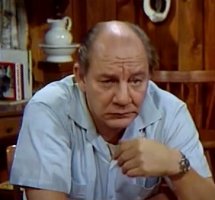
The next scene is a purely comic one, which opens with Martha sewing suspenders into Grandpa's pants so he won't "forget" them in the future. As George points out, "it's not the suspenders he forgets." It's worth mentioning here how deeply strange George and Martha's relationship is. He's rarely anything but insulting to her, but nonetheless clearly loves her deeply. He calls her "Mommy", and she calls him "Daddy", and I refuse to comment any further on that. It's implied many times throughout the series that they have a far healthier sex life than Mary and Tom do, George shown here playfully pinching Martha's butt.
The only real plot development of the episode comes in this scene, when Cathy announces that she has been fired from her waitressing job at the Capri lounge. We get a first taste here of George's rabid protectiveness of his daughters, one of his defining characteristics. Debralee Scott has a wonderful moment here when she breaks into a chorus of "Something's Coming" while speculating about her future. She must have inherited this tendency from Martha, who we'll soon see loves to croon old 30s and 40s numbers at the oddest of moments.
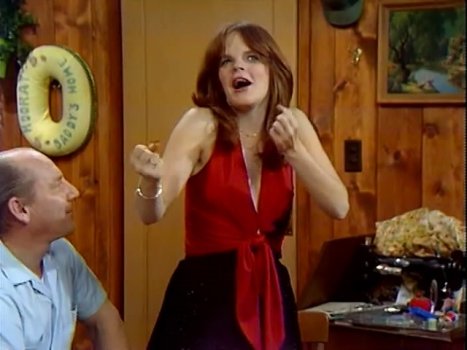
"Something's coming, something good. . ."
But once again, the meat of this episode is in the development of Tom and Mary's marital problems. When we first see them, they're in bed in a moment of semi-passion, Tom nibbling in Mary's ear.
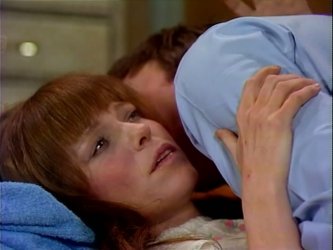
MARY: Don't nibble in my ear. You can nibble on the outside of my ear, or on my ear, but when you do it in my ear, I can't hear.
This is another example of how beautifully balanced the writing of these characters is. On my first viewing, I saw Tom as almost purely a villain due to the protectiveness I naturally felt for the terribly fragile and sweet Mary. But let's remember, she's been cajoling Tom to show her some affection for weeks now with no success, and here she is, criticizing his lovemaking technique in a none too gentle manner, right in the midst of the intimate moment she's been longing for. It practically stops him dead. But if that wasn't enough, she inexplicibly adds this:
MARY: I'm sorry. I love you. I just can't stop thinking about Sergeant Foley.
Just the perfect subject to bring up while your husband is trying to make love to you for the first time in weeks. She reveals to Tom that Foley touched her cheek at the Capri. I can't imagine what she was thinking bringing this up at this moment with Tom, a man whose ego is prone to crumbling at the slightest provocation.
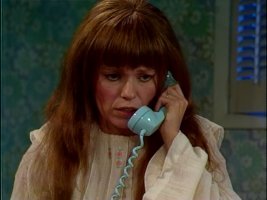 It's almost fortunate that they're interrupted by a phone call, in which an anoymous caller asks Mary about Heather because he "just wanted to make sure I didn't have the wrong one." Mary's response is typically consumer based: "Is this a dial-a-joke?"1 The call naturally terrifies Mary, giving Tom the opportunity to play the strong male and comfort her. Note, too, that for all Mary suffers the consequences of Tom's rigid view of gender roles in the bedroom, she fully expects and needs him to play the typical masculine role in most other areas of their lives. It's a confused, hypocritical message to send him, and he's confused enough about his masculinity on his own. Things are never as simple as they first seem on MH2.
It's almost fortunate that they're interrupted by a phone call, in which an anoymous caller asks Mary about Heather because he "just wanted to make sure I didn't have the wrong one." Mary's response is typically consumer based: "Is this a dial-a-joke?"1 The call naturally terrifies Mary, giving Tom the opportunity to play the strong male and comfort her. Note, too, that for all Mary suffers the consequences of Tom's rigid view of gender roles in the bedroom, she fully expects and needs him to play the typical masculine role in most other areas of their lives. It's a confused, hypocritical message to send him, and he's confused enough about his masculinity on his own. Things are never as simple as they first seem on MH2.
Soon enough, Tom's amorousness deflates, telling Mary, "I think I'm losing my momentum". There's a nice bit of humor here in their mutual confusion over whether hot or cold showers will work better to rekindle the spark.
TOM: I'm in the mood for a bath.
Mary reminisces that the last time they took a shower together was when they gave Heather's crib away:
MARY: We decided to take a nice long hot shower together, and you said to me, "Hey Mary. . . this is fun".
Almost as gripping as the story of how they first met from episode 3.
In the next scene, we discern instantly what the outcome of the prior night was long before the dialogue confirms it, based only on Tom's body language and facial expressions (more wonderful acting from Mullavey).
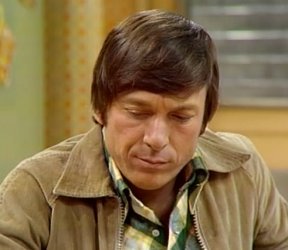
Clearly, Tom struck out last night.
Mary starts out trying to avoid the subject with mindless chatter:
MARY: Did you know that pop tarts aren't that good for our teeth? It's the coffee isn't? Bad coffee just will kill anything, won't it? What am I gonna do about my coffee? I've tried every kind. I've tried drip, I've tried grind. . .
Obviously she knows exactly what's bothering him, but is using her usual coping strategy of retreating to safe trivialities. When that doesn't work, she tries to connect directly by telling him how much she loves him, which engenders the exact opposite reaction she was hoping for:
TOM: That is the worst thing you coud have said at this moment. The worst.
As he storms out of the house, she shouts after him, almost pleadingly:
MARY: Tom, you did try. You tried! You just can't spend that much time in a hot shower!
I don't entirely understand Tom's reaction to Mary's expression of love and understanding here, so perhaps someone in the comments can enlighten me. Usually, much as I dislike Tom's behavior, I understand where it's coming from. But why is "I love you very much" the worst thing Mary could have said to him at that moment? Surely, it would have been far worse if she'd said, just to pick one example, "Shame you couldn't get it up again last night."
I love the brief moments with Heather in this scene just after Tom's exit where she demands money from her mother, paying no attention whatsoever to how clearly upset she is:
HEATHER: I need a dollar for tap class.
MARY: A dollar? Isn't that a lot?
HEATHER: Just gimmee.
As she, too, storms out of the house, Mary has a very, very rare moment of honest reflection about her daughter when she says, in the understatement of the week, "She's not a happy child." Usually, Mary finds the reality of her daughter's personality too awful to face, instead burying it under mounds of false bravado about what a wonderful, wonderful child she is.
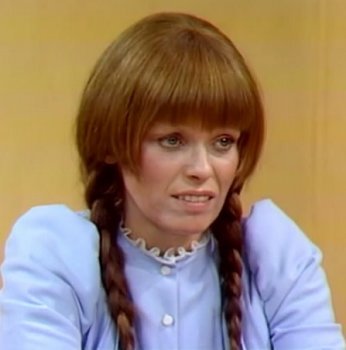
"She's not a happy child."
There's another nice interaction here between Mary and Grandpa, then Loretta and Cathy arrive to find out how things went with Tom last night. They're interrupted by a new character, Blanche Fedders (Reva Rose), who's trying to rouse them all to join a protest against rising prices.
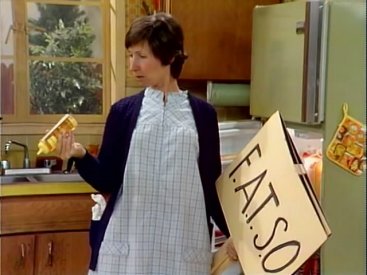
Another new character is introduced when Mary receives a phone call from the local librarian, Mrs. Delorean (Iris Korn) to inform her that the books she requested are now available. Louise Lasser's reactions on the other end of the call, trying to conceal what she and the librarian are actually discussing, are wonderful:
MRS. DELORIAN: We have those books you ordered.
CATHY: Mary, who is that?
MARY: I don't know. . . s-s-somebody.
MRS. DELOREAN: Those titles would be: Sex and the Female Response, You and Your Climax, 343 Ways To Improve Your Marriage, and It's Your Body, Do It: A Guide to Erotic Pleasures. Miss Hartman, these are the books you ordered?
MARY: Yes, I'll tell her.
MRS. DELOREAN: You are Ms. Mary Hartman at 343 Bratner Street?
MARY: Yes, that's right, and that happens to be her favorite color.
MRS. DELOREAN: Miss Hartman, are you all right?
MARY: Well, I'll tell you, I took a very long shower last night, and I woke up with a real bad headache this morning, so I took a couple of aspirin, you know. . .
And so ends our first week in Fernwood. Quite a funny scene, though one could hardly consider this ending typical of daytime soap's usual Friday cliffhangers. But I know if I were seeing this when it aired in 1976, I'd surely have been tuning in the following Monday.
1 For those too young to remember, "Dial-a-joke" was the most popular of the defunct 976 phone exchange pay-per-minute services, which were the precursor of today's 900 numbers. Back
Actors:
Director:
- Log in to post comments
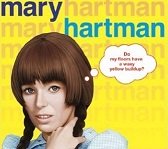
Comments
SkipEastport
Sat, 01/11/2014 - 18:21
Permalink
Tom's reaction
That part of the scene stood out to me when I saw it on Lifetime in the 90s and again re-watching on dvd. The reason was because I've been in situations like that where someone said "the worst possible thing" to me, not understanding what I was feeling at that moment. So even though I can't tell you what the line meant from Tom's perspective or even the writers, it sticks out to me as a very realistic situation, the kind of real life detail we can relate to but scriptwriters don't often capture.
WGaryW
Mon, 01/13/2014 - 03:17
Permalink
re: Tom's reaction
I'm glad to read I'm not the only to have taken special note of that moment, regardless of whether you have a handy explanation for it or not. Maybe there wasn't meant to be a direct explanation at all, just an emotional outburst that he was pinning on whatever Mary could have said. Even unexplained, it certainly doesn't ring false to me; I was just thrown by it.
Maybe someone else will have a specific theory. Best I can come up with is too weak for me to have offered it in the review, I think-- that he takes "I love you" at that moment as a statement of pity, as if Mary is saying it only to console him for his sexual dysfunction.
metatron1970
Thu, 02/27/2014 - 15:59
Permalink
Mrs. Delorean the Librarian
I'd like to chime in with a few words about Iris Korn as Mrs. Delorean the librarian. Her line deliveries to me were absolutely hilarious. The title of the books Mary is checking out are funny in themselves, but delivered by Ms. Korn with her impeccable diction they become magnificent laugh-out-loud moments. I roared upon hearing her recite the title "It's Your Body--Do It: A guide to Erotic Pleasures." Mrs Delorean pops up in scattered episodes throughout season 1 and became an integral character of an important subplot in Season 2. I knew I recognized the voice from somewhere else but could not remember where I'd seen her before. Then I remembered: as a child of the 70's I was raised with Little House on the Prairie and I'm not ashamed to say it remains a series I never tire of seeing. Ms. Korn guest starred in the Season 6 episode "Preacher Takes A Wife" as a feisty widow who pursues and wins Rev. Alden's affections. Dabs Greer talks about working with her on one of the DVD extras. The character would have made a delightful addition to Walnut Grove and the character would have returned, but Ms. Korn sadly died not long after filming the episode. On a semi-related note, either Michael Landon or the casting director of Little House must have been huge fans of MH2 as there are a number of actors who went on to guest starring spots or (as in the case of Matthew Laborteaux) full-blown Little House characters. In one season 2 episode of MH2 I counted no less than three future Little House alumni in the very same scene (James Cromwell, Robert Casper, Laborteaux). The steady acting work enjoyed by many of MH2's veterans indicates the regard many in the industry must have had for the series in the late 70's/80's.